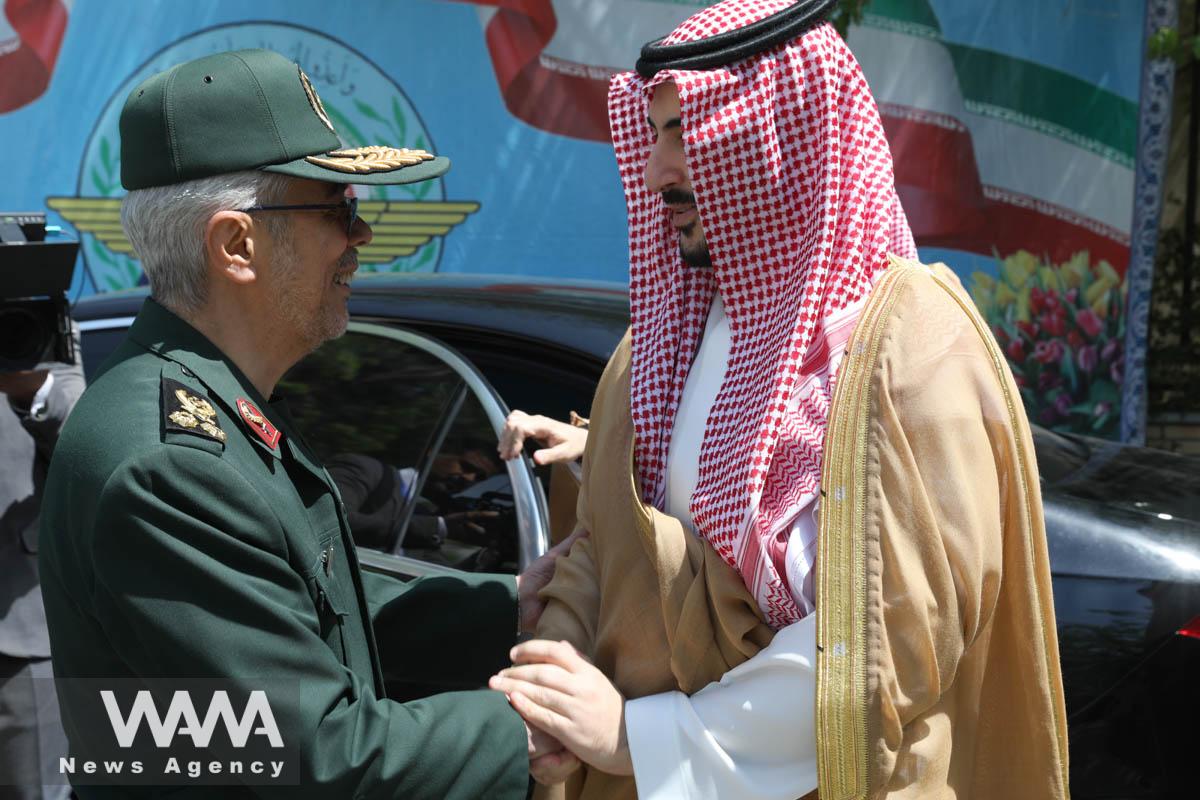Khalid bin Salman’s Mission in Tehran
WANA (Apr 21) – The visit of Saudi Arabia’s Defense Minister, Khalid bin Salman, along with a high-ranking delegation to Tehran, can be seen as a turning point in the revitalized relations between Iran and Saudi Arabia, following the Beijing Agreement.
Khalid, carrying a message from the Saudi King to Iran’s Supreme Leader, held high-level meetings with senior Iranian officials—a clear sign of Tehran rolling out the red carpet for the top Saudi envoy. Beyond his political standing in Riyadh and his close relationship with Crown Prince Mohammed bin Salman—which makes the visit particularly notable—the trip can be analyzed on several overlapping and interconnected levels.

Chief of Iranian Armed Forces, Mohammad Bagheri, welcomes Saudi Defence Minister, Prince Khalid bin Salman, in Tehran, Iran, April 17, 2025. Iranian Armed Forces Office/WANA (West Asia News Agency)
Regional and International Dimensions
This visit underscores that Saudi Arabia’s new regional approach—aimed at fostering stability and de-escalating crises—is not merely tactical but rather a strategic shift. Structurally, it reflects a change in Saudi priorities under the broader framework of Vision 2030, which places regional security and development at its core. This shift is evident in Riyadh’s movement away from closely aligning with U.S. policies toward adopting a more neutral and constructive stance in regional disputes, including those involving Iran, the U.S., and Israel.
From this strategic lens, Khalid bin Salman’s visit sent a clear message from Tehran to Washington: Riyadh is not part of the “maximum pressure” campaign and will not serve as a launchpad for attacks against Iran. Saudi Arabia supports diplomatic solutions to the nuclear issue and does not seek war. In other words, by asserting its foreign policy independence, Riyadh is signaling that while it won’t join Western military coalitions, it is fully open to, and indeed part of, any agreement that leads to peace and stability in the Persian Gulf.
This context also weakens the hypothesis that Saudi Arabia’s rapprochement with Iran is a short-term tactic—coordinated with the U.S.—to counterbalance Iran’s regional influence (including its leverage over energy routes). Riyadh’s outlook on the Beijing agreement appears strategic rather than opportunistic. That said, Saudi Arabia, as a frontline player in a potential Iran–U.S. confrontation, is simultaneously seeking to improve its coordination with all parties, including Tehran and Washington.

Iranian President Calls for Strengthening Iran-Saudi Ties
WANA (Apr 17) – Iran’s President Masoud Pezeshkian emphasized the urgent need for unity and cohesion in the Islamic world during a meeting on Thursday with Saudi Arabia’s Defense Minister, Prince Khalid bin Salman bin Abdulaziz, and his accompanying delegation. He called for expanding bilateral cooperation between Iran and Saudi Arabia across all sectors […]
Subregional Context
Given Khalid bin Salman’s involvement in regional files—and the presence of Saudi Ambassador to Yemen, Mohammed bin Saeed Al-Jaber, in the delegation—the Yemen dossier was another key item on the agenda. From Riyadh’s perspective, Iran is expected—under the Beijing framework—to pressure Ansarullah (Houthis) into showing greater commitment to securing the Red Sea waterways. This is tied to the Saudi-Houthi peace efforts in 2023, which could be jeopardized by continued instability.
The delineation of a new roadmap for Yemen, amid U.S. airstrikes and the Arab Coalition’s preparations for a ground offensive on Sana’a, was central to Khalid’s consultations in Tehran. There’s also a possibility that Saudi Arabia is reaching out to Iran to help manage or contain Houthi responses. While quietly coordinating with the U.S., Riyadh also signals to the Houthis its continued commitment to the ceasefire—yet insists that a lasting peace requires halting military operations in the Red Sea.
Bilateral Perspective
Shifts in Saudi Arabia’s domestic and regional priorities have created a valuable opportunity for both Tehran and Riyadh to turn the page on decades of tension. By linking security and development, they can pursue mutually beneficial bilateral relations and lay the foundation for a new neighborly dynamic. Moving toward a model of collective security in the region, both sides have a chance to replace hostility with cooperative yet competitive engagement.
In this process, economic ties and trade remain the missing links in Iran–Saudi relations. Alongside political and security confidence-building, both nations must work to strengthen non-political dimensions of their relationship, paving the way for sustainable, comprehensive cooperation.
Saudi Defense Minister’s Anti-Israeli Remarks During Meeting with #Iran’s Supreme Leader
The Director of Public Relations at the Office of the Supreme Leader of Iran wrote:
“During his meeting with the Leader of the Islamic Revolution, the Saudi Defense Minister expressed… pic.twitter.com/6Df8pcgEzK
— WANA News Agency (@WANAIran) April 18, 2025












